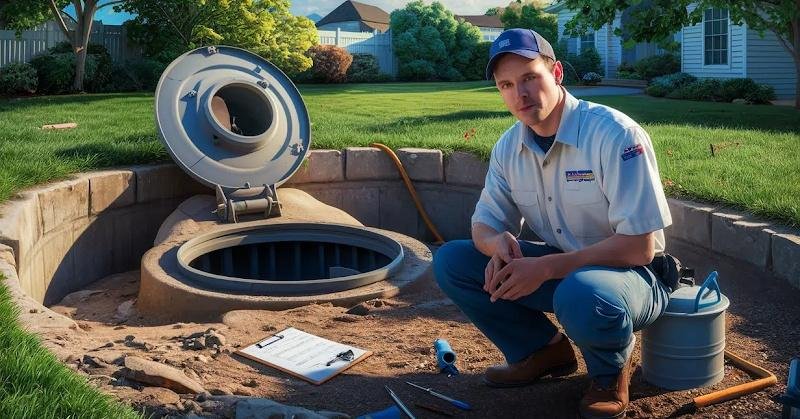A well-maintained septic system is crucial for keeping your home running smoothly, avoiding unpleasant backups, and ensuring your environment remains healthy. But one of the common questions homeowners have is: how often should I schedule septic tank cleaning?
The answer is not a one-size-fits-all, as several factors can influence how often your septic tank needs to be cleaned. Understanding these factors will help you stay on top of your septic system’s needs and avoid expensive repairs down the road.
What is Septic Tank Cleaning?
Septic tank cleaning, also called septic tank pumping, involves the process of removing sludge, scum, and other solids that accumulate inside the tank over time. These solids build up as wastewater from your home enters the tank and settles. The liquid portion of the waste flows out of the tank into the drain field, while solids remain in the tank, creating the sludge.
Without proper cleaning, the sludge builds up and can cause blockages, leading to problems like slow draining, foul odors, or even system failure. Regular cleaning ensures your septic system operates efficiently and effectively.
Also Read : Maximize Growth and Grasp Potential
Factors That Affect How Often You Should Clean Your Septic Tank
Several factors impact how often your septic tank needs to be cleaned. Let’s look at the most common ones:
Household Size
The size of your household plays a significant role in how quickly your septic tank fills up. Larger households generate more wastewater, which means more solid waste will accumulate in the tank. If you have a large family, you may need to clean your septic tank more often than someone with a smaller household.
- Small households (1-2 people): Every 3-5 years
- Medium households (3-4 people): Every 2-3 years
- Large households (5+ people): Every 1-2 years
The more people you have in your home, the more waste is produced, which leads to faster buildup in the tank.
Water Usage
How much water you use daily also affects the frequency of septic tank cleaning. If your family uses large amounts of water—whether through long showers, running multiple appliances, or even frequent laundry—this could lead to a quicker buildup of sludge in your tank. By conserving water, you may be able to extend the time between cleanings.
- Fix leaks: A dripping faucet or running toilet can waste gallons of water each day, adding to the load on your septic system.
- Use water-saving devices: Installing low-flow toilets, faucets, and showerheads can significantly reduce water usage.
Conserving water can help extend the life of your septic system and reduce the frequency of cleaning.
Tank Size
The size of your septic tank is one of the most significant factors in determining how often you need cleaning. Larger tanks hold more waste, meaning it will take longer for the solids to build up. On the other hand, smaller tanks fill up more quickly and require more frequent maintenance.
- Smaller tanks: If you have a smaller tank, you will likely need to pump it out more frequently, especially if you have a large household or use a lot of water.
- Larger tanks: A larger tank will take longer to fill, and you may not need to clean it as often.
Septic System Design
The type and design of your septic system can also influence how often you need to clean it. Some systems are designed to handle more waste, while others, such as alternative systems (like aerobic systems), may require more frequent attention due to their specialized nature.
For example, a conventional septic system may need less frequent cleaning than an aerobic system, which requires more maintenance.
Systems with multiple tanks or additional pump chambers may also need more attention. Be sure to check with your professional septic service provider to understand your specific system’s needs.
Use of Septic Additives
Many homeowners use septic tank additives to help break down waste and prevent sludge buildup. While some additives claim to improve the system’s health, they should not be used as a substitute for regular cleaning. Most experts recommend having the tank cleaned based on your household size, water usage, and tank size, regardless of whether or not additives are used.
While additives can help to a certain extent, cleaning is still necessary to remove the buildup of solid waste and prevent clogs.
Also Read : The Significance Of A “Clear Fire” In 18th-Century Cooking
Signs That You Need Septic Tank Cleaning
While it’s always good to follow a scheduled cleaning routine, certain signs indicate that your septic tank might need attention sooner. Keep an eye out for these warning signs:
- Slow draining sinks, showers, or toilets: If water drains slowly from your sinks or toilets, it may be a sign that your septic tank is full and needs cleaning.
- Foul odors: Unpleasant smells in your yard or near the septic tank can indicate that there’s a backup or clog in the system.
- Standing water: If you notice pools of water in your yard, especially near the drain field, it could be a sign that the tank is overfull or the system is failing.
- Gurgling sounds: Gurgling noises in your pipes or toilet are often signs of air trapped in the system, which can occur when there’s a clog or the tank needs to be emptied.
If you notice any of these signs, it’s important to call a professional septic service provider to inspect and clean the tank.
Benefits of Regular Septic Tank Cleaning
Regular septic tank cleaning has several important benefits, including:
- Prevents costly repairs: By cleaning your septic tank regularly, you can avoid blockages, backups, and other issues that could lead to costly repairs or even system replacement.
- Extends the life of your septic system: Proper maintenance ensures that your septic system runs smoothly for many years, helping you get the most out of your investment.
- Improves efficiency: A clean tank helps your system work at full capacity, improving its efficiency and reducing the chances of problems.
- Maintains health and safety: Keeping your septic system in good condition ensures that it does not contaminate the surrounding soil or groundwater, protecting your health and the environment.
- Complies with local regulations: In some areas, septic tank maintenance is required by law, and regular cleanings ensure you remain compliant with local health codes and regulations.
How to Schedule Septic Tank Cleaning
The first step in scheduling septic tank cleaning is to find a professional septic service provider in your area. Many companies offer septic tank pumping and cleaning services and can provide a schedule based on your system’s specific needs.
Here’s what to consider when scheduling a septic cleaning:
- Professional inspection: A septic expert can inspect your tank and let you know when it’s due for cleaning. They’ll check the sludge and scum levels to determine when to clean your tank.
- Clean before problems arise: It’s better to clean your septic tank regularly than to wait for it to get full and cause a backup. Waiting too long can result in expensive repairs or even the need to replace your septic system.
- Follow a set schedule: Many homeowners find it helpful to set a reminder every 1 to 5 years, depending on their household size and water usage. This proactive approach helps avoid surprises and ensures your system stays in good shape.
Conclusion
Regular septic tank cleaning is essential to keep your system functioning properly and to avoid expensive repairs. While the general recommendation is to clean your septic tank every 3 to 5 years, your specific needs may vary depending on your household size, water usage, tank size, and system type. Be sure to work with a professional septic service provider to determine the best cleaning schedule for your home and stay on top of regular maintenance.
By cleaning your septic tank regularly and paying attention to signs of trouble, you’ll ensure your system continues to work efficiently and your property remains healthy for years to come.










